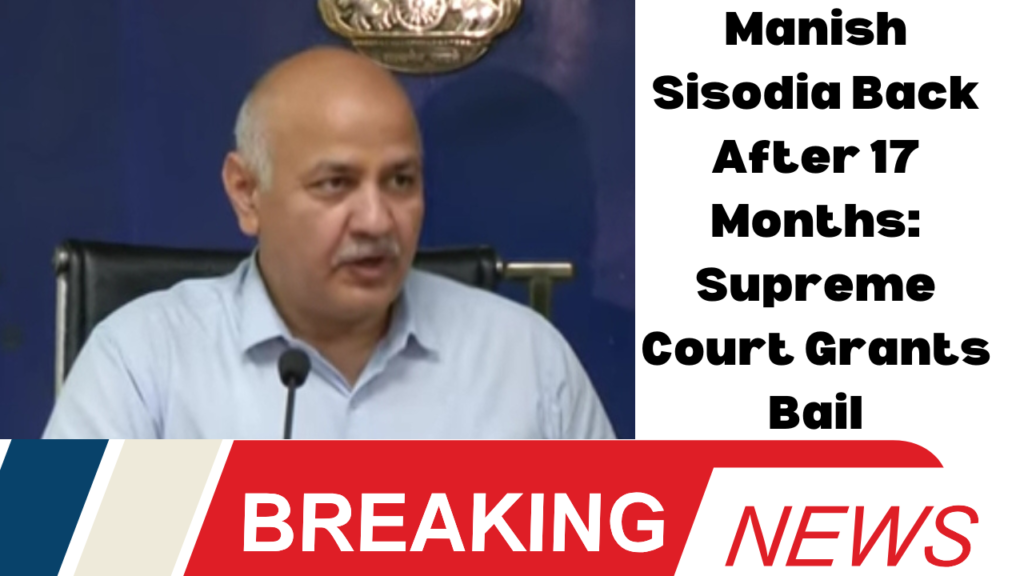In a significant development, the Supreme Court has granted conditional bail to Manish Sisodia, the former Deputy Chief Minister and Education Minister of Delhi, in connection with the Delhi liquor policy scam. Sisodia, who was arrested on February 26, 2023, has spent over 530 days in jail. This ruling marks a major shift in the high-profile case that has drawn substantial public and media attention.
The Supreme Court’s decision to grant bail comes with several conditions.
Notably, Sisodia is required to surrender his passport as part of the bail terms. The Court’s judgment underscores a crucial legal principle: bail should be granted as a rule rather than withheld as a sentence. This principle aims to address the growing concerns that trial and high courts have increasingly forgotten the settled law that bail is the norm, and denial is the exception.
The Court’s observation highlights a broader issue within the judicial system, where a growing number of bail petitions are overwhelming the courts. The Supreme Court emphasized that the denial of bail, even in cases with substantial evidence, often results in a backlog of bail pleas, burdening the judicial system.
The case against Sisodia involves serious allegations related to the Delhi liquor policy. The Central Bureau of Investigation (CBI) and the Enforcement Directorate (ED) have claimed that the Aam Aadmi Party (AAP), which Sisodia was part of, allegedly demanded a bribe of Rs 100 crore for the Goa elections. According to the prosecution, Rs 45 crore has already been recovered, supported by digital evidence. The investigation has implicated Sisodia in overseeing the Excise Department, with allegations that co-accused Vijay Nair was tasked with managing the bribes.
Sisodia’s arrest had a considerable impact on the Delhi government and the AAP.
As the Deputy Chief Minister, his absence was keenly felt, affecting the functioning and coordination within the Delhi government. Sisodia’s image as a competent and dedicated official was seen as crucial for the smooth operation of government departments. His removal from office and subsequent imprisonment created a significant void, disrupting the rhythm of governance and administrative efficiency.
The Supreme Court’s ruling comes at a critical time as the Delhi Assembly elections approach. Sisodia’s bail is expected to provide a significant boost to the morale of AAP workers, who had been disheartened by his prolonged incarceration. The return of Sisodia is anticipated to energize the party’s election campaign and improve its strategic positioning in the upcoming electoral battles.
In addition to Sisodia’s bail, Chief Minister Arvind Kejriwal remains in jail, having been arrested in March 2024 in connection with the same excise policy case. The ongoing detention of Kejriwal further underscores the importance of Sisodia’s return to the political arena. With both leaders currently out of action, the AAP has faced challenges in maintaining its organizational momentum and electoral strategy.
Sisodia’s release from jail is likely to have a multifaceted impact. It is expected to reinvigorate the party’s leadership and operational dynamics, fostering better coordination between ministers and officials. The absence of Sisodia had been felt significantly, as his leadership was instrumental in various government functions and initiatives.
In summary, the Supreme Court’s decision to grant bail to Manish Sisodia, while imposing strict conditions, marks a pivotal moment in the ongoing legal and political saga surrounding the Delhi liquor policy case. The ruling is set to influence both the operational dynamics of the Delhi government and the strategic outlook of the AAP as it prepares for upcoming elections.














Great!!! Thank you for sharing this details. If you need some information about SEO than have a look here Article World